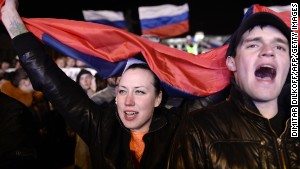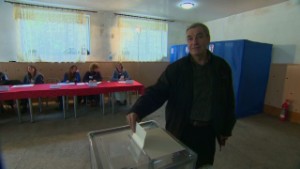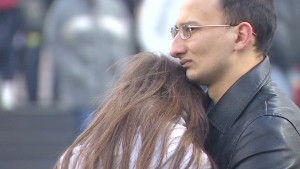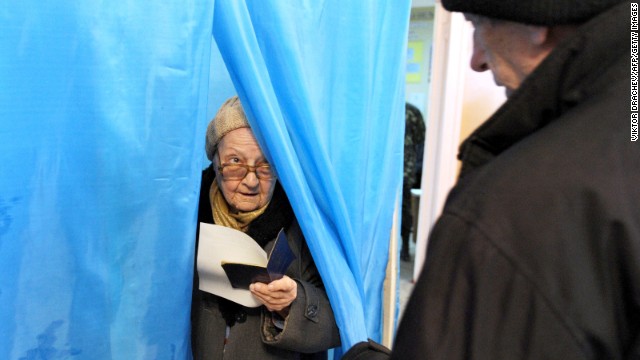March 17, 2014 -- Updated 0956 GMT (1756 HKT)
To no one's surprise, Ukraine's autonomous
Crimea region has voted overwhelmingly to break off from Ukraine and
join Russia to join Russia. But what happens next is far from certain.
Diplomatically, Sunday's
referendum has put the United States and Russia on the kind of collision
course not seen since the end of the Cold War. Economically, it's
unclear how much such a coupling will cost Russia. And politically, it's
divided Crimeans -- some of whom think it will bring better pay, and
some who see this is a Kremlin land grab.
An overwhelming 96.7% of Crimea chose the option of annexation by Moscow. Turnout was 83%.

Russia: Crimea vote was legal

Mixed feelings after Crimean referendum

Crimea votes to return to "Motherland"

The mood is grim in Kiev Square
On Monday, lawmakers in
Crimea approved a resolution that declared the Black Sea peninsula an
independent, sovereign state. They then filed an appeal to join Russia.
Moscow strongly backed
Sunday's referendum; the majority of the population is ethnic Russian.
And Russian lawmakers have said they will welcome Crimea with open arms.
Russian President Vladimir Putin will address a joint session of parliament on Crimea on Tuesday.
But the backlash to the referendum has been harsh from the West.
EU foreign ministers were meeting in Brussels Monday to discuss sanctions against Russia.
"I don't have to remind
any of you that it's illegal under the constitution of Ukraine and under
international law" European Union foreign policy chief Catherine Ashton
said.
Speaking ahead of the
meeting which may look at asset freezes as well as travel restrictions,
she called on Russia "yet again" to meet with Ukrainian leaders and try
to move towards de-escalation. But she said: "We've seen no evidence of
that."
The White House said it
won't recognize the outcome, saying the vote was "administered under
threats of violence and intimidation from a Russian military
intervention that violates international law."
Moscow strongly backed Sunday's referendum in the Black Sea peninsula where the majority of the population is ethnic Russian.
What next
Uncertainties stemming
from a possible break up from Ukraine has fueled rumors about a looming
legal vacuum in the crisis-hit region, causing panic and confusion.
Details on how the
financial system will work if Crimea decides to join Russia were
sketchy. A secession would mean transferring banks, public utilities and
public transport from Ukraine to Russia in what would undoubtedly be a
costly operation.
A special tax regime may
be introduced for Crimea, Russia's state-run Itar-Tass reported Monday,
citing Russian Finance Minister Sergei Shatalov.
In Moscow, fears of Russia's possible economic isolation amid the political crisis in Ukraine have worried investors.
The Russian ruble was
trading at an all-time low while the Russian stock market fell 24% from
its peak this year. Russia's Deputy PM said Sunday that the ruble could
be introduced into Crimea in two months'.
A bad day
Many Crimeans hope union
with Russia will bring better pay and make them citizens of a country
capable of asserting itself on the world stage. Others saw the
referendum as a land grab by the Kremlin from Ukraine, whose new rulers
want to move the country towards the European Union and away from
Moscow's sway.
In Kiev, Prime Minister
Arseny Yatseniuk threatened dire consequences for the Crimean
politicians who had called the vote, threatening to try them in
Ukrainian and international courts.
Apart from Crimea,
tension is also running high in parts of the Russian-speaking
industrialized east of Ukraine near the border with Russia, with clashes
between rival demonstrators.
Thousands of pro-Russia
demonstrators rallied beneath a towering statue of Soviet revolutionary
Vladimir Lenin in Donetsk's main square, with chants of "Donetsk is a
Russian city" ringing out as the protesters rallied in a show of support
for the Crimean referendum, and to demand their own.
Russia lawmakers saying parliament will discuss the future of Crimea on Friday.
"All the necessary
legislative decisions on the results of the referendum will be taken as
soon as possible" said Sergey Neverov, the deputy speaker of the lower
house of parliament in Russia. "The referendum shows that the people of
Crimea see their future as a part of Russia."
Christopher Hill, a
former U.S. ambassador to South Korea, Iraq and Poland, described Sunday
as a bad day for East-West relations.
"Putin has left our
president with no choice. He needs to impose sanctions. I know Putin
will come back and impose his own," he said. "I think the end of this is
going to be to cast Russia out into the cold. And the problem is, I
don't think Putin really cares. I think this is where he wants to take
Russia."

No comments:
Post a Comment